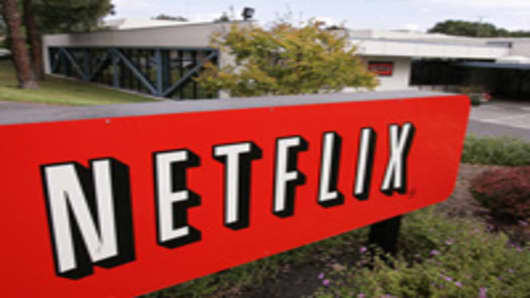Netflix's stock had a roller coaster day following the company's reversal of a plan to re-brand its DVD-by-mail service as "Qwikster."
First, the stock soared on the news that the company is ditching the new Qwikster brand: Making it easier to access both subscriptions in one place should reduce "churn," the number of people who drop the service.
But then the stock tanked, falling to a new 52 week low as it sunk in that the company is *not* changing its plan to split the subscriptions, raising prices for the nearly half of all Netflix subscribers who want both services, by as much as 60 percent to $16. After all, higher prices could be just as likely — more so? — to push customers to drop subscriptions than the inconvenience of two websites with different accounts and logins.
So what does this really mean?
The good news:
Netflix listens to customers and investors. And CEO Reed Hastings, isn't so caught up in his reputation as a visionary that he's willing to admit he made a misstep.
Hastings issued a full-out mea culpa for the Qwikster idea he announced three weeks ago, writing: "There is a difference between moving quickly — which Netflix has done very well for years — and moving too fast, which is what we did this case."
Investors can be assured that Netflix seems to have learned its lesson to take all the measures it can to make the two subscription system as easy as possible. Bottom line: Netflix won't sacrifice customers for the sake of its *own* convenience.
The bad news:
Netflix isn't wavering on its plan to separate the DVD rental and video streaming services, instituting separate pricing schemes — higher prices for subscribers to both.
Hastings wrote in his blog: "While the July price change was necessary, we are now done with changes." What that really means is that the July price change and separating the two businesses is necessary — they can't change it. Bottom line: Netflix sees its DVD business plateauing, and its future in streaming. It could have waited a few years to separate out the businesses, Hastings pulled off the band-aid to enable his executives better manage the two businesses.
The ugly?
We'll see if these changes affected Netflix's "churn" when the company releases third quarter earnings on October 24. Wall Street analysts seem to agree that Hastings was wise to kill "Qwikster" before its launch, though he'd have been smarter to have never introduced the idea. Piper Jaffray's Olson says Netflix's moves will be smart over the long term, the next few years. The question now, is how much damage will they wreak on subscriber numbers, and the stock, in the near term. We'll have to wait a few weeks for the earnings announcement to know the answer.
Questions? Comments? MediaMoney@cnbc.com



